Analyzing People Management: Issues, Skills and HR Processes
VerifiedAdded on 2023/06/18
|10
|2690
|170
Report
AI Summary
This report delves into the multifaceted challenges faced by managers in effectively managing people within organizations, highlighting critical issues such as declining performance, inadequate training, communication breakdowns, skill gaps, high staff turnover, excessive work pressure, and unfavorable workplace culture. It emphasizes the essential knowledge, skills, and behaviors required for effective people management, including strong communication, motivation, and problem-solving abilities, alongside the importance of a clear vision, employee recognition, and task allocation based on individual strengths. Furthermore, the report explores HR processes that underpin performance management, such as tracking employee productivity and absence rates, assessing the quality of hire, fostering employee innovation, implementing reward and recognition schemes, and adopting the 8-box model for strategic alignment. Finally, it provides actionable recommendations for enhancing employee performance through continuous performance reviews, targeted training and development, improved communication strategies, a supportive work environment, and clearly defined goals, all aimed at fostering a motivated and productive workforce.
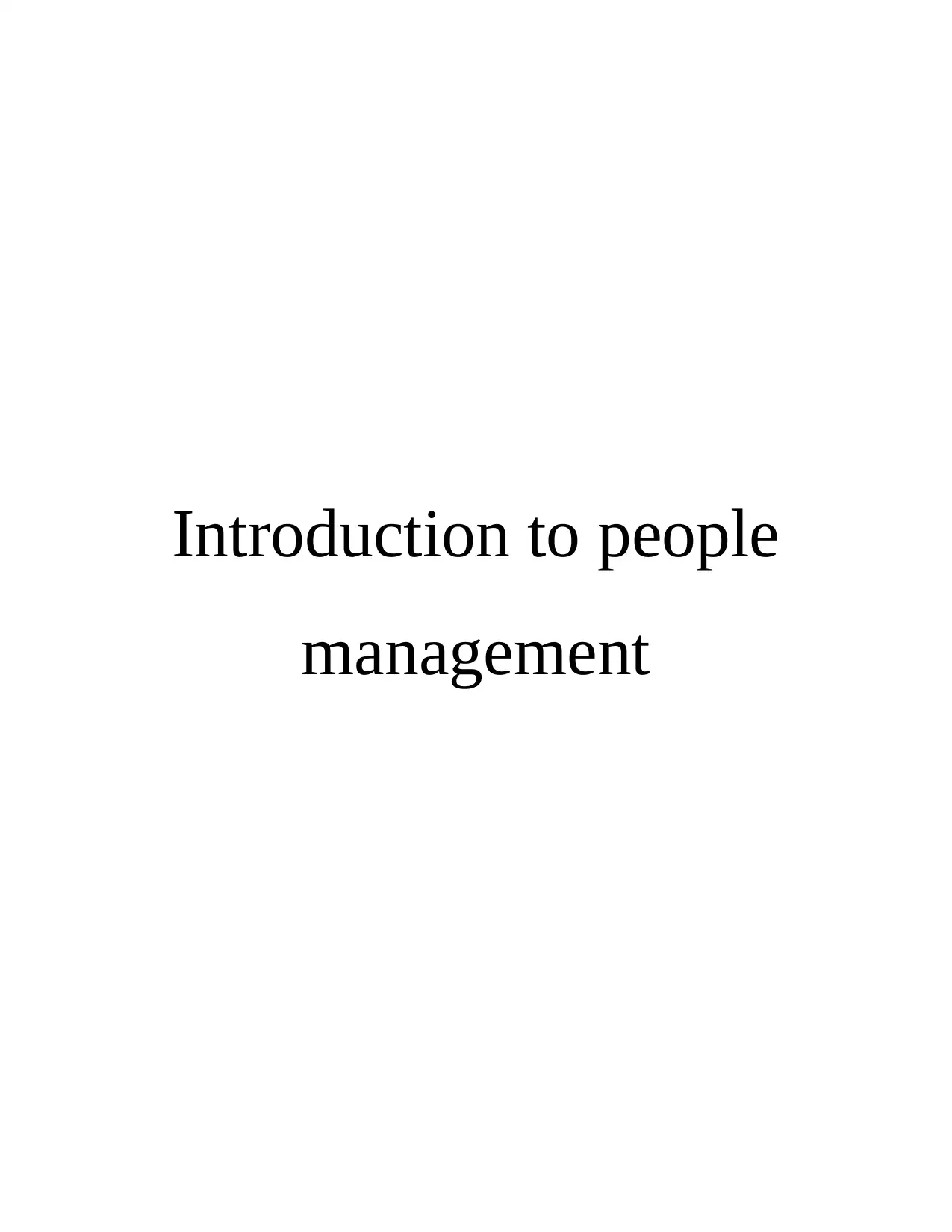
Introduction to people
management
management
Paraphrase This Document
Need a fresh take? Get an instant paraphrase of this document with our AI Paraphraser
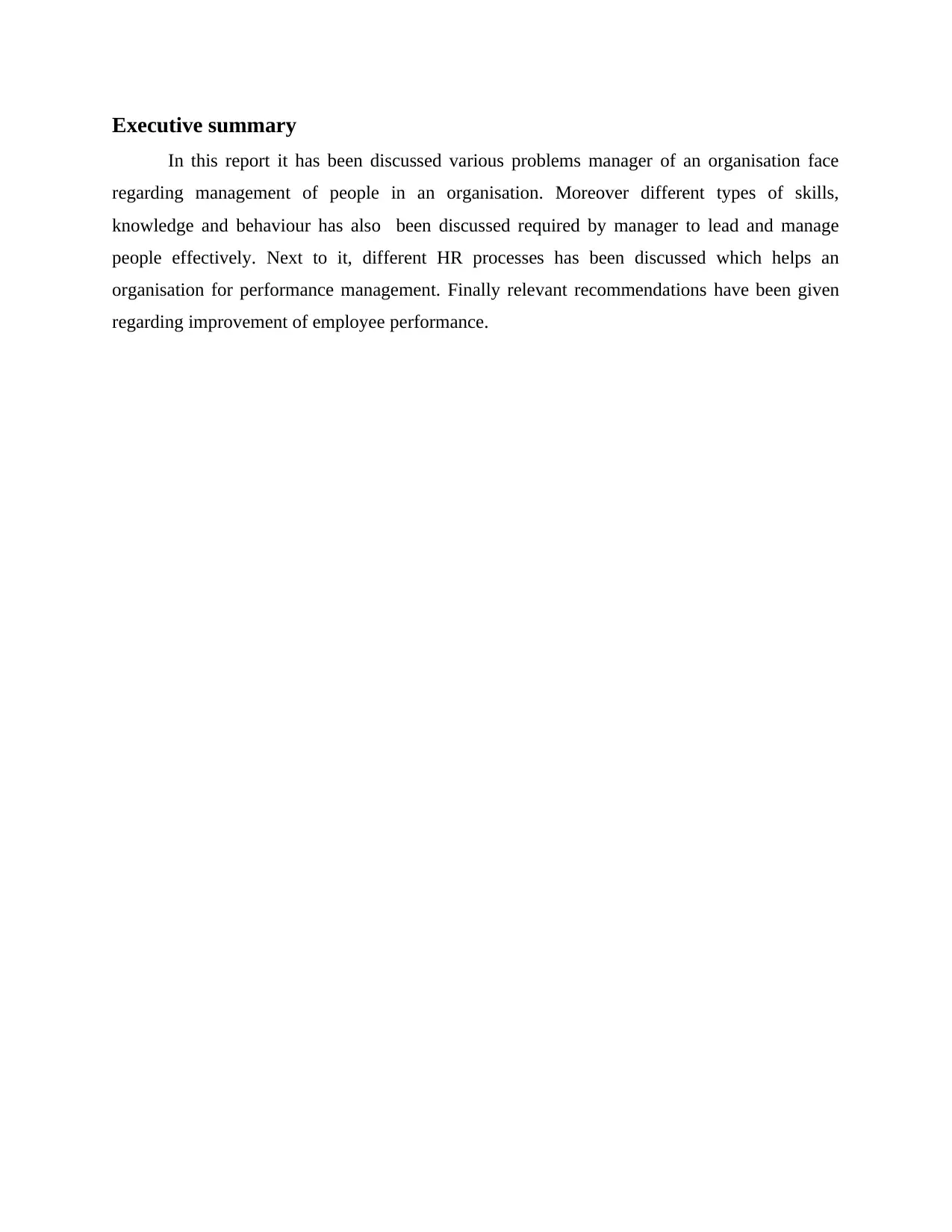
Executive summary
In this report it has been discussed various problems manager of an organisation face
regarding management of people in an organisation. Moreover different types of skills,
knowledge and behaviour has also been discussed required by manager to lead and manage
people effectively. Next to it, different HR processes has been discussed which helps an
organisation for performance management. Finally relevant recommendations have been given
regarding improvement of employee performance.
In this report it has been discussed various problems manager of an organisation face
regarding management of people in an organisation. Moreover different types of skills,
knowledge and behaviour has also been discussed required by manager to lead and manage
people effectively. Next to it, different HR processes has been discussed which helps an
organisation for performance management. Finally relevant recommendations have been given
regarding improvement of employee performance.
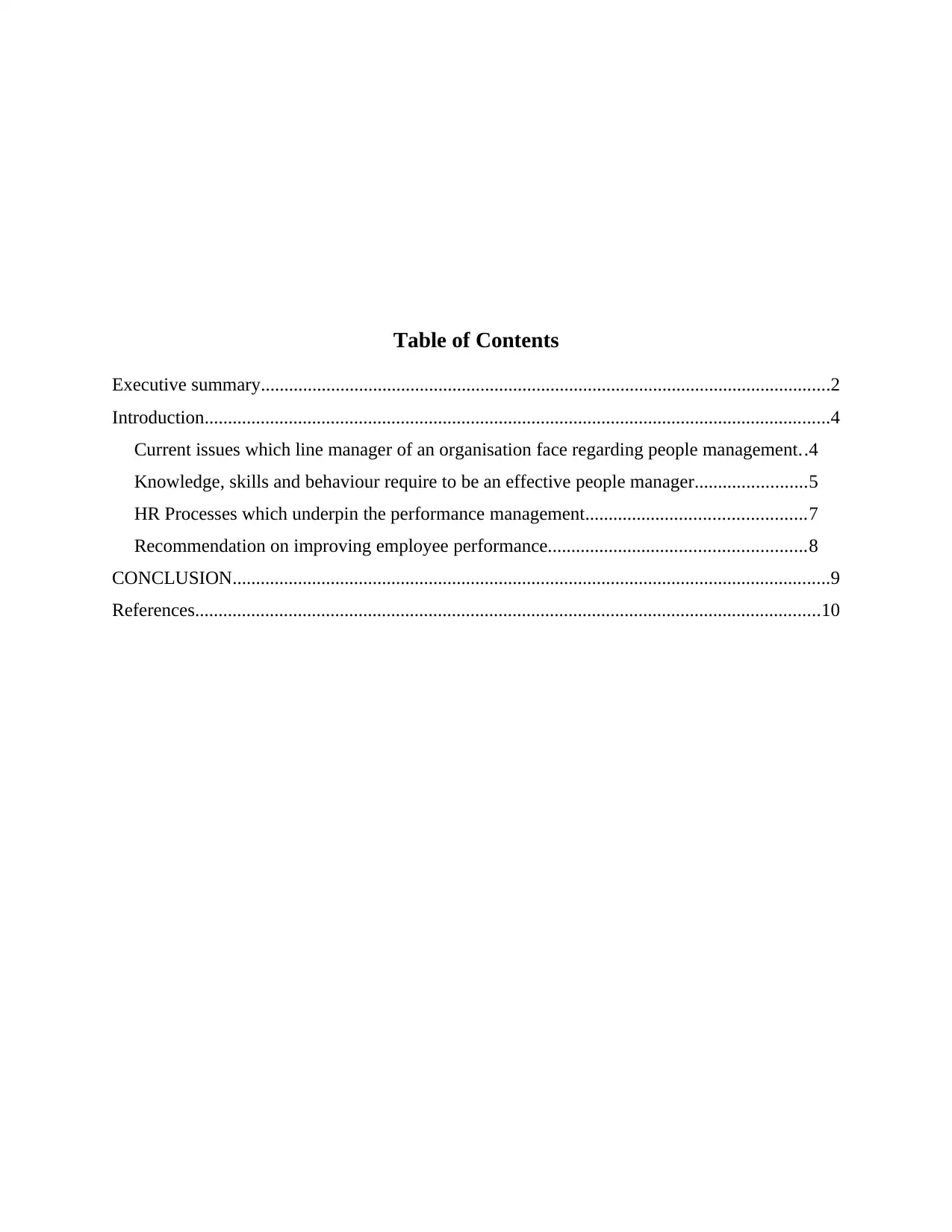
Table of Contents
Executive summary..........................................................................................................................2
Introduction......................................................................................................................................4
Current issues which line manager of an organisation face regarding people management..4
Knowledge, skills and behaviour require to be an effective people manager........................5
HR Processes which underpin the performance management...............................................7
Recommendation on improving employee performance.......................................................8
CONCLUSION................................................................................................................................9
References......................................................................................................................................10
Executive summary..........................................................................................................................2
Introduction......................................................................................................................................4
Current issues which line manager of an organisation face regarding people management..4
Knowledge, skills and behaviour require to be an effective people manager........................5
HR Processes which underpin the performance management...............................................7
Recommendation on improving employee performance.......................................................8
CONCLUSION................................................................................................................................9
References......................................................................................................................................10
⊘ This is a preview!⊘
Do you want full access?
Subscribe today to unlock all pages.

Trusted by 1+ million students worldwide
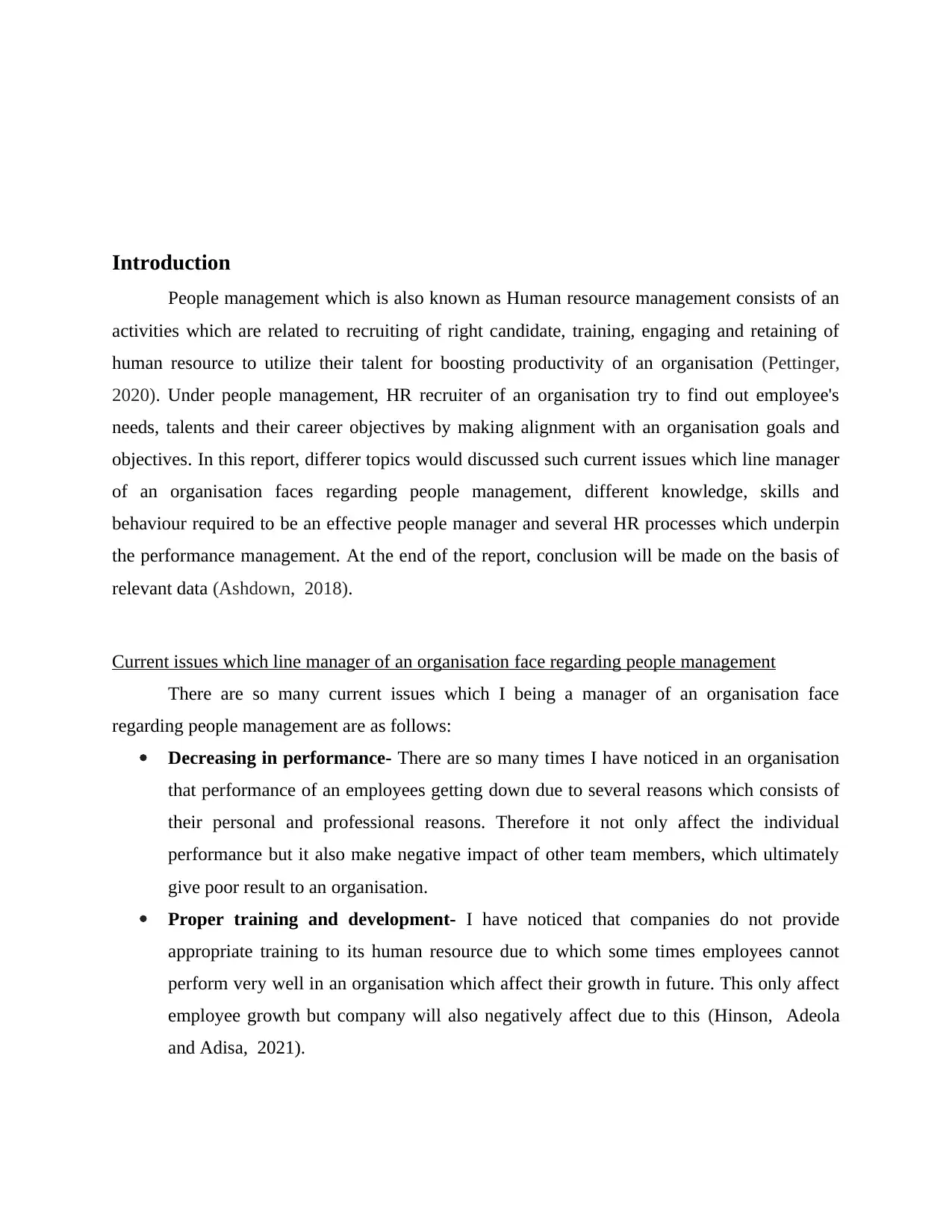
Introduction
People management which is also known as Human resource management consists of an
activities which are related to recruiting of right candidate, training, engaging and retaining of
human resource to utilize their talent for boosting productivity of an organisation (Pettinger,
2020). Under people management, HR recruiter of an organisation try to find out employee's
needs, talents and their career objectives by making alignment with an organisation goals and
objectives. In this report, differer topics would discussed such current issues which line manager
of an organisation faces regarding people management, different knowledge, skills and
behaviour required to be an effective people manager and several HR processes which underpin
the performance management. At the end of the report, conclusion will be made on the basis of
relevant data (Ashdown, 2018).
Current issues which line manager of an organisation face regarding people management
There are so many current issues which I being a manager of an organisation face
regarding people management are as follows:
Decreasing in performance- There are so many times I have noticed in an organisation
that performance of an employees getting down due to several reasons which consists of
their personal and professional reasons. Therefore it not only affect the individual
performance but it also make negative impact of other team members, which ultimately
give poor result to an organisation.
Proper training and development- I have noticed that companies do not provide
appropriate training to its human resource due to which some times employees cannot
perform very well in an organisation which affect their growth in future. This only affect
employee growth but company will also negatively affect due to this (Hinson, Adeola
and Adisa, 2021).
People management which is also known as Human resource management consists of an
activities which are related to recruiting of right candidate, training, engaging and retaining of
human resource to utilize their talent for boosting productivity of an organisation (Pettinger,
2020). Under people management, HR recruiter of an organisation try to find out employee's
needs, talents and their career objectives by making alignment with an organisation goals and
objectives. In this report, differer topics would discussed such current issues which line manager
of an organisation faces regarding people management, different knowledge, skills and
behaviour required to be an effective people manager and several HR processes which underpin
the performance management. At the end of the report, conclusion will be made on the basis of
relevant data (Ashdown, 2018).
Current issues which line manager of an organisation face regarding people management
There are so many current issues which I being a manager of an organisation face
regarding people management are as follows:
Decreasing in performance- There are so many times I have noticed in an organisation
that performance of an employees getting down due to several reasons which consists of
their personal and professional reasons. Therefore it not only affect the individual
performance but it also make negative impact of other team members, which ultimately
give poor result to an organisation.
Proper training and development- I have noticed that companies do not provide
appropriate training to its human resource due to which some times employees cannot
perform very well in an organisation which affect their growth in future. This only affect
employee growth but company will also negatively affect due to this (Hinson, Adeola
and Adisa, 2021).
Paraphrase This Document
Need a fresh take? Get an instant paraphrase of this document with our AI Paraphraser
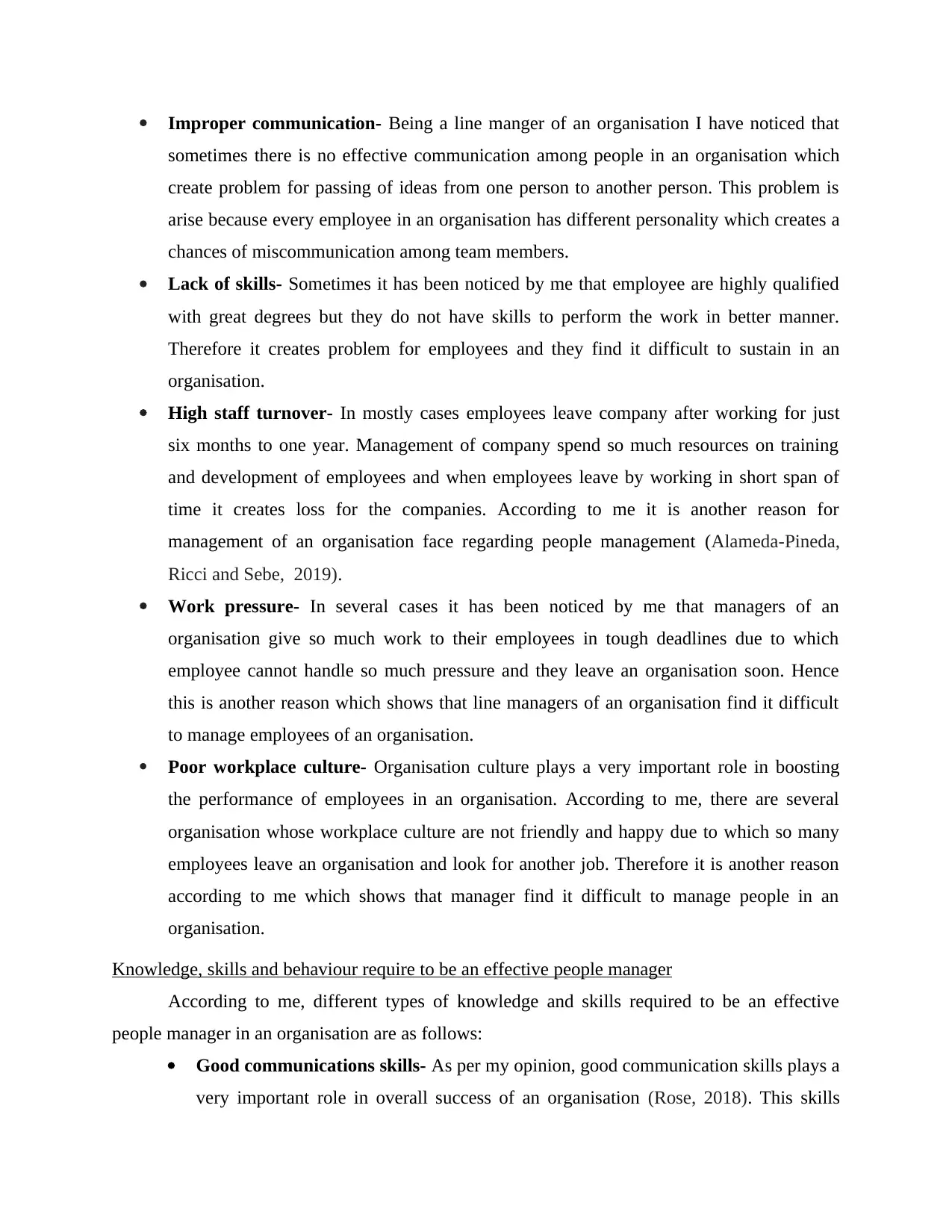
Improper communication- Being a line manger of an organisation I have noticed that
sometimes there is no effective communication among people in an organisation which
create problem for passing of ideas from one person to another person. This problem is
arise because every employee in an organisation has different personality which creates a
chances of miscommunication among team members.
Lack of skills- Sometimes it has been noticed by me that employee are highly qualified
with great degrees but they do not have skills to perform the work in better manner.
Therefore it creates problem for employees and they find it difficult to sustain in an
organisation.
High staff turnover- In mostly cases employees leave company after working for just
six months to one year. Management of company spend so much resources on training
and development of employees and when employees leave by working in short span of
time it creates loss for the companies. According to me it is another reason for
management of an organisation face regarding people management (Alameda-Pineda,
Ricci and Sebe, 2019).
Work pressure- In several cases it has been noticed by me that managers of an
organisation give so much work to their employees in tough deadlines due to which
employee cannot handle so much pressure and they leave an organisation soon. Hence
this is another reason which shows that line managers of an organisation find it difficult
to manage employees of an organisation.
Poor workplace culture- Organisation culture plays a very important role in boosting
the performance of employees in an organisation. According to me, there are several
organisation whose workplace culture are not friendly and happy due to which so many
employees leave an organisation and look for another job. Therefore it is another reason
according to me which shows that manager find it difficult to manage people in an
organisation.
Knowledge, skills and behaviour require to be an effective people manager
According to me, different types of knowledge and skills required to be an effective
people manager in an organisation are as follows:
Good communications skills- As per my opinion, good communication skills plays a
very important role in overall success of an organisation (Rose, 2018). This skills
sometimes there is no effective communication among people in an organisation which
create problem for passing of ideas from one person to another person. This problem is
arise because every employee in an organisation has different personality which creates a
chances of miscommunication among team members.
Lack of skills- Sometimes it has been noticed by me that employee are highly qualified
with great degrees but they do not have skills to perform the work in better manner.
Therefore it creates problem for employees and they find it difficult to sustain in an
organisation.
High staff turnover- In mostly cases employees leave company after working for just
six months to one year. Management of company spend so much resources on training
and development of employees and when employees leave by working in short span of
time it creates loss for the companies. According to me it is another reason for
management of an organisation face regarding people management (Alameda-Pineda,
Ricci and Sebe, 2019).
Work pressure- In several cases it has been noticed by me that managers of an
organisation give so much work to their employees in tough deadlines due to which
employee cannot handle so much pressure and they leave an organisation soon. Hence
this is another reason which shows that line managers of an organisation find it difficult
to manage employees of an organisation.
Poor workplace culture- Organisation culture plays a very important role in boosting
the performance of employees in an organisation. According to me, there are several
organisation whose workplace culture are not friendly and happy due to which so many
employees leave an organisation and look for another job. Therefore it is another reason
according to me which shows that manager find it difficult to manage people in an
organisation.
Knowledge, skills and behaviour require to be an effective people manager
According to me, different types of knowledge and skills required to be an effective
people manager in an organisation are as follows:
Good communications skills- As per my opinion, good communication skills plays a
very important role in overall success of an organisation (Rose, 2018). This skills
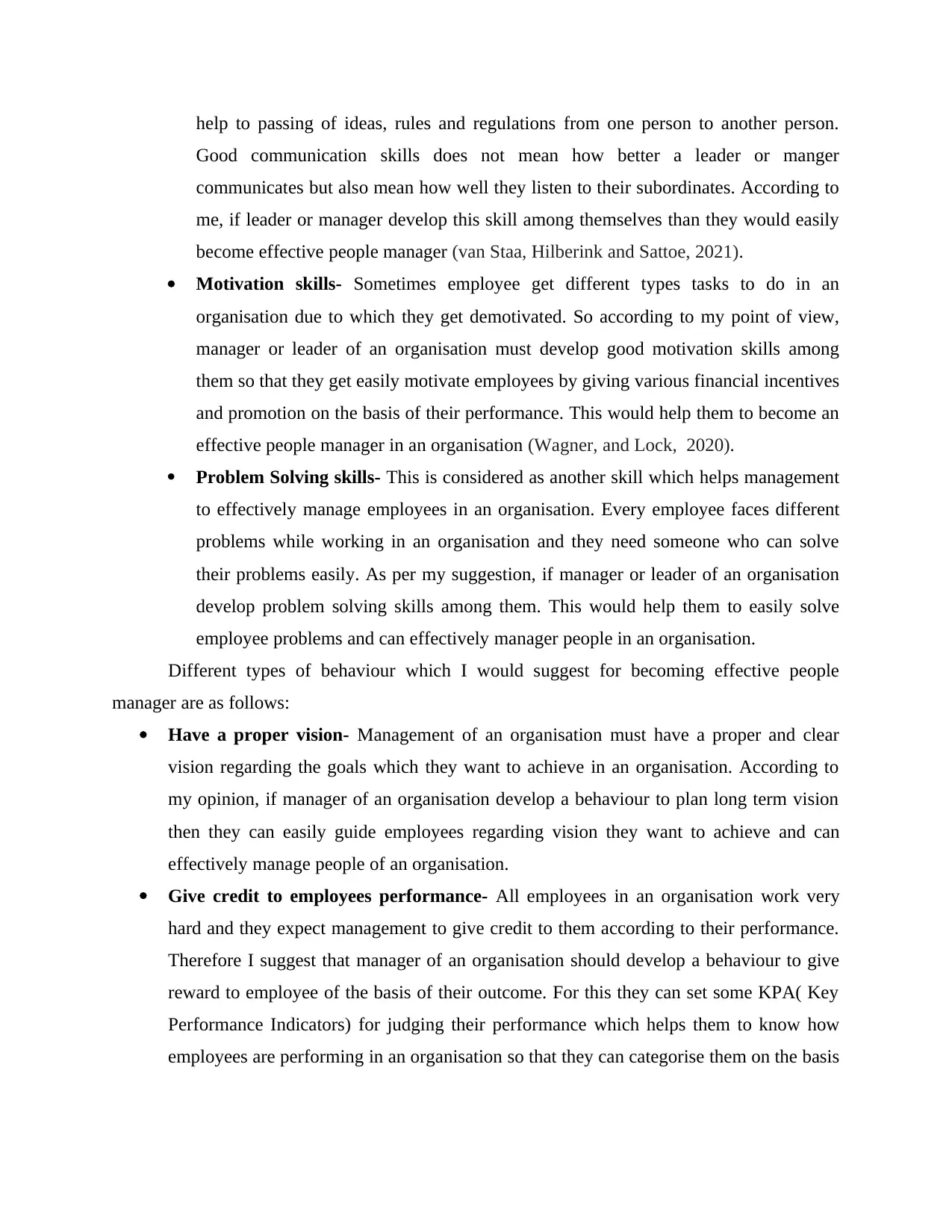
help to passing of ideas, rules and regulations from one person to another person.
Good communication skills does not mean how better a leader or manger
communicates but also mean how well they listen to their subordinates. According to
me, if leader or manager develop this skill among themselves than they would easily
become effective people manager (van Staa, Hilberink and Sattoe, 2021).
Motivation skills- Sometimes employee get different types tasks to do in an
organisation due to which they get demotivated. So according to my point of view,
manager or leader of an organisation must develop good motivation skills among
them so that they get easily motivate employees by giving various financial incentives
and promotion on the basis of their performance. This would help them to become an
effective people manager in an organisation (Wagner, and Lock, 2020).
Problem Solving skills- This is considered as another skill which helps management
to effectively manage employees in an organisation. Every employee faces different
problems while working in an organisation and they need someone who can solve
their problems easily. As per my suggestion, if manager or leader of an organisation
develop problem solving skills among them. This would help them to easily solve
employee problems and can effectively manager people in an organisation.
Different types of behaviour which I would suggest for becoming effective people
manager are as follows:
Have a proper vision- Management of an organisation must have a proper and clear
vision regarding the goals which they want to achieve in an organisation. According to
my opinion, if manager of an organisation develop a behaviour to plan long term vision
then they can easily guide employees regarding vision they want to achieve and can
effectively manage people of an organisation.
Give credit to employees performance- All employees in an organisation work very
hard and they expect management to give credit to them according to their performance.
Therefore I suggest that manager of an organisation should develop a behaviour to give
reward to employee of the basis of their outcome. For this they can set some KPA( Key
Performance Indicators) for judging their performance which helps them to know how
employees are performing in an organisation so that they can categorise them on the basis
Good communication skills does not mean how better a leader or manger
communicates but also mean how well they listen to their subordinates. According to
me, if leader or manager develop this skill among themselves than they would easily
become effective people manager (van Staa, Hilberink and Sattoe, 2021).
Motivation skills- Sometimes employee get different types tasks to do in an
organisation due to which they get demotivated. So according to my point of view,
manager or leader of an organisation must develop good motivation skills among
them so that they get easily motivate employees by giving various financial incentives
and promotion on the basis of their performance. This would help them to become an
effective people manager in an organisation (Wagner, and Lock, 2020).
Problem Solving skills- This is considered as another skill which helps management
to effectively manage employees in an organisation. Every employee faces different
problems while working in an organisation and they need someone who can solve
their problems easily. As per my suggestion, if manager or leader of an organisation
develop problem solving skills among them. This would help them to easily solve
employee problems and can effectively manager people in an organisation.
Different types of behaviour which I would suggest for becoming effective people
manager are as follows:
Have a proper vision- Management of an organisation must have a proper and clear
vision regarding the goals which they want to achieve in an organisation. According to
my opinion, if manager of an organisation develop a behaviour to plan long term vision
then they can easily guide employees regarding vision they want to achieve and can
effectively manage people of an organisation.
Give credit to employees performance- All employees in an organisation work very
hard and they expect management to give credit to them according to their performance.
Therefore I suggest that manager of an organisation should develop a behaviour to give
reward to employee of the basis of their outcome. For this they can set some KPA( Key
Performance Indicators) for judging their performance which helps them to know how
employees are performing in an organisation so that they can categorise them on the basis
⊘ This is a preview!⊘
Do you want full access?
Subscribe today to unlock all pages.

Trusted by 1+ million students worldwide
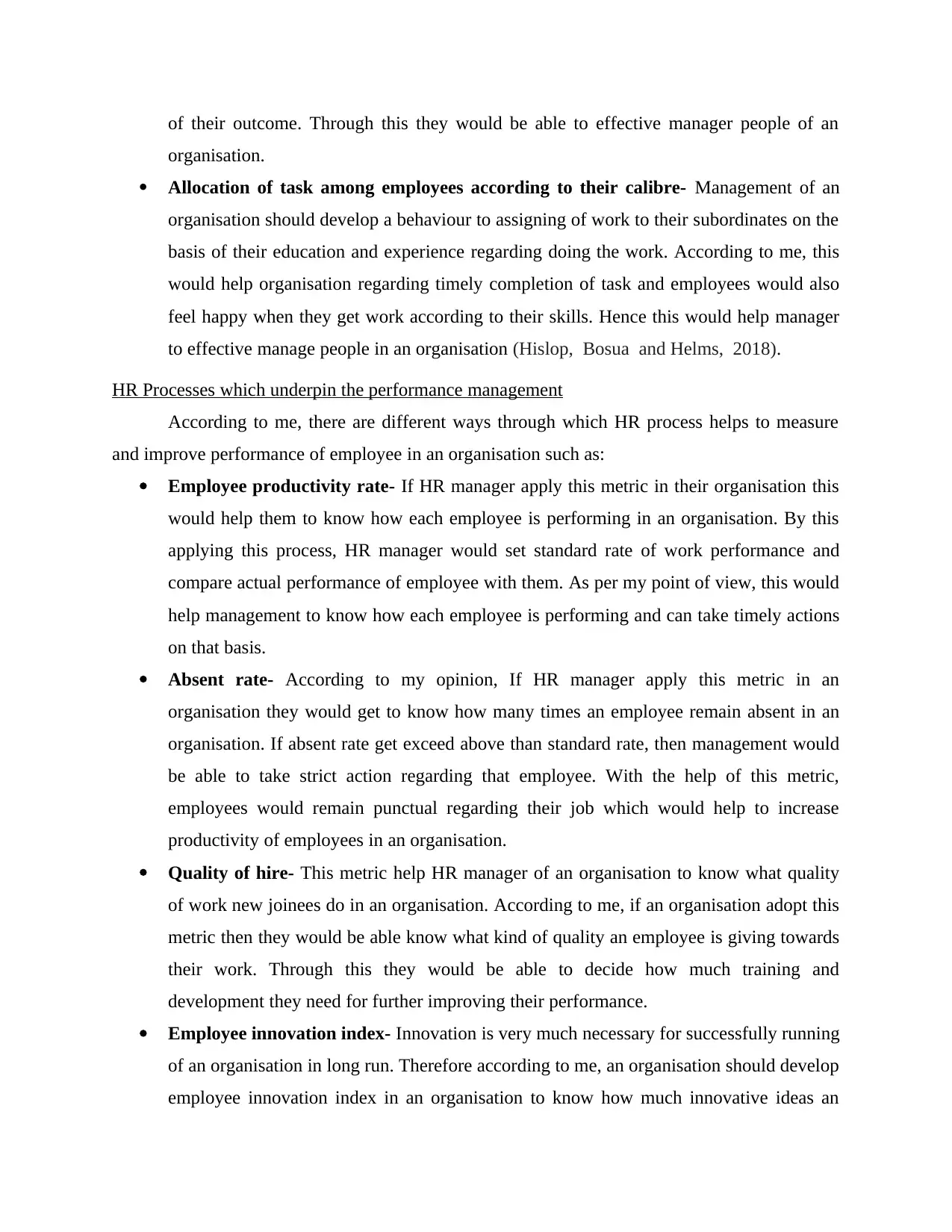
of their outcome. Through this they would be able to effective manager people of an
organisation.
Allocation of task among employees according to their calibre- Management of an
organisation should develop a behaviour to assigning of work to their subordinates on the
basis of their education and experience regarding doing the work. According to me, this
would help organisation regarding timely completion of task and employees would also
feel happy when they get work according to their skills. Hence this would help manager
to effective manage people in an organisation (Hislop, Bosua and Helms, 2018).
HR Processes which underpin the performance management
According to me, there are different ways through which HR process helps to measure
and improve performance of employee in an organisation such as:
Employee productivity rate- If HR manager apply this metric in their organisation this
would help them to know how each employee is performing in an organisation. By this
applying this process, HR manager would set standard rate of work performance and
compare actual performance of employee with them. As per my point of view, this would
help management to know how each employee is performing and can take timely actions
on that basis.
Absent rate- According to my opinion, If HR manager apply this metric in an
organisation they would get to know how many times an employee remain absent in an
organisation. If absent rate get exceed above than standard rate, then management would
be able to take strict action regarding that employee. With the help of this metric,
employees would remain punctual regarding their job which would help to increase
productivity of employees in an organisation.
Quality of hire- This metric help HR manager of an organisation to know what quality
of work new joinees do in an organisation. According to me, if an organisation adopt this
metric then they would be able know what kind of quality an employee is giving towards
their work. Through this they would be able to decide how much training and
development they need for further improving their performance.
Employee innovation index- Innovation is very much necessary for successfully running
of an organisation in long run. Therefore according to me, an organisation should develop
employee innovation index in an organisation to know how much innovative ideas an
organisation.
Allocation of task among employees according to their calibre- Management of an
organisation should develop a behaviour to assigning of work to their subordinates on the
basis of their education and experience regarding doing the work. According to me, this
would help organisation regarding timely completion of task and employees would also
feel happy when they get work according to their skills. Hence this would help manager
to effective manage people in an organisation (Hislop, Bosua and Helms, 2018).
HR Processes which underpin the performance management
According to me, there are different ways through which HR process helps to measure
and improve performance of employee in an organisation such as:
Employee productivity rate- If HR manager apply this metric in their organisation this
would help them to know how each employee is performing in an organisation. By this
applying this process, HR manager would set standard rate of work performance and
compare actual performance of employee with them. As per my point of view, this would
help management to know how each employee is performing and can take timely actions
on that basis.
Absent rate- According to my opinion, If HR manager apply this metric in an
organisation they would get to know how many times an employee remain absent in an
organisation. If absent rate get exceed above than standard rate, then management would
be able to take strict action regarding that employee. With the help of this metric,
employees would remain punctual regarding their job which would help to increase
productivity of employees in an organisation.
Quality of hire- This metric help HR manager of an organisation to know what quality
of work new joinees do in an organisation. According to me, if an organisation adopt this
metric then they would be able know what kind of quality an employee is giving towards
their work. Through this they would be able to decide how much training and
development they need for further improving their performance.
Employee innovation index- Innovation is very much necessary for successfully running
of an organisation in long run. Therefore according to me, an organisation should develop
employee innovation index in an organisation to know how much innovative ideas an
Paraphrase This Document
Need a fresh take? Get an instant paraphrase of this document with our AI Paraphraser
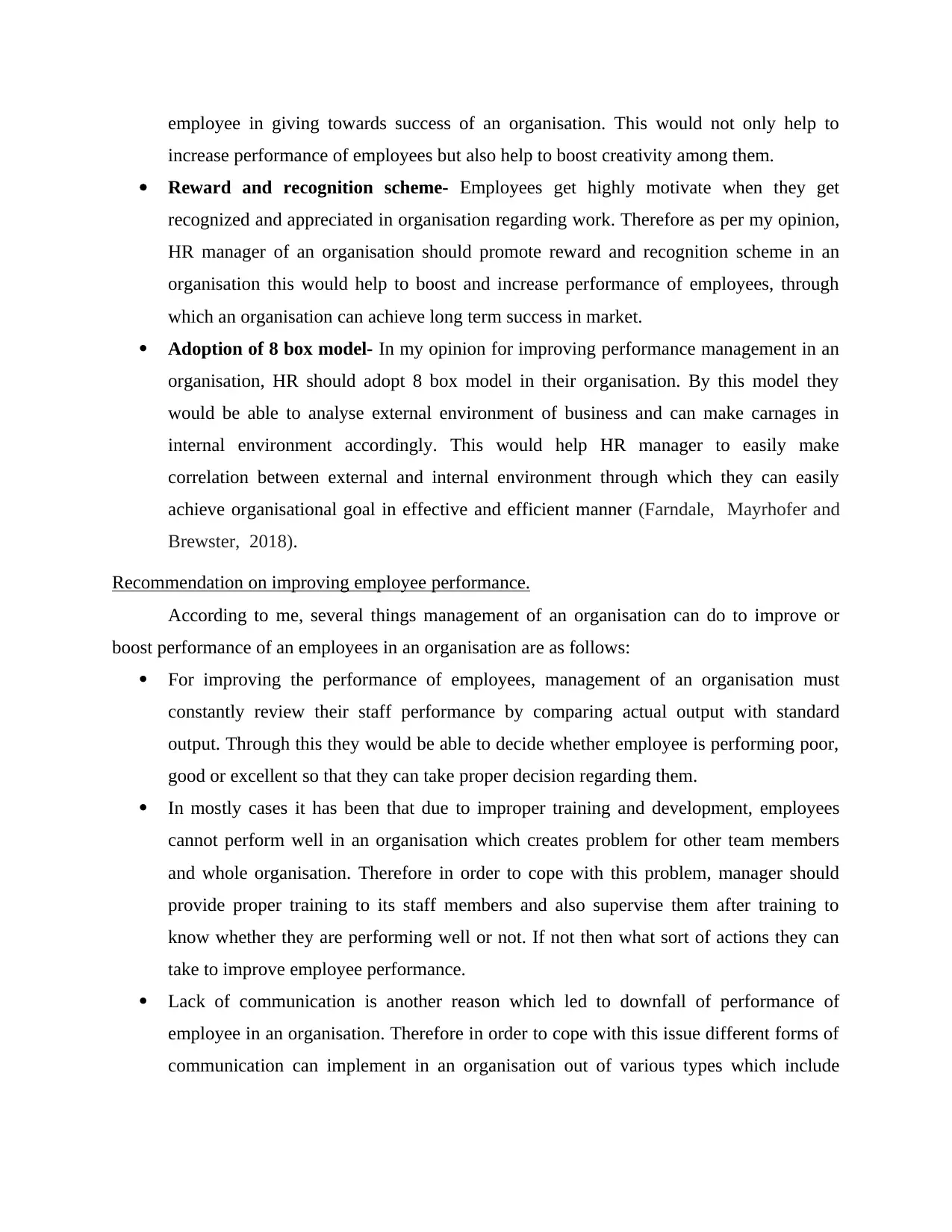
employee in giving towards success of an organisation. This would not only help to
increase performance of employees but also help to boost creativity among them.
Reward and recognition scheme- Employees get highly motivate when they get
recognized and appreciated in organisation regarding work. Therefore as per my opinion,
HR manager of an organisation should promote reward and recognition scheme in an
organisation this would help to boost and increase performance of employees, through
which an organisation can achieve long term success in market.
Adoption of 8 box model- In my opinion for improving performance management in an
organisation, HR should adopt 8 box model in their organisation. By this model they
would be able to analyse external environment of business and can make carnages in
internal environment accordingly. This would help HR manager to easily make
correlation between external and internal environment through which they can easily
achieve organisational goal in effective and efficient manner (Farndale, Mayrhofer and
Brewster, 2018).
Recommendation on improving employee performance.
According to me, several things management of an organisation can do to improve or
boost performance of an employees in an organisation are as follows:
For improving the performance of employees, management of an organisation must
constantly review their staff performance by comparing actual output with standard
output. Through this they would be able to decide whether employee is performing poor,
good or excellent so that they can take proper decision regarding them.
In mostly cases it has been that due to improper training and development, employees
cannot perform well in an organisation which creates problem for other team members
and whole organisation. Therefore in order to cope with this problem, manager should
provide proper training to its staff members and also supervise them after training to
know whether they are performing well or not. If not then what sort of actions they can
take to improve employee performance.
Lack of communication is another reason which led to downfall of performance of
employee in an organisation. Therefore in order to cope with this issue different forms of
communication can implement in an organisation out of various types which include
increase performance of employees but also help to boost creativity among them.
Reward and recognition scheme- Employees get highly motivate when they get
recognized and appreciated in organisation regarding work. Therefore as per my opinion,
HR manager of an organisation should promote reward and recognition scheme in an
organisation this would help to boost and increase performance of employees, through
which an organisation can achieve long term success in market.
Adoption of 8 box model- In my opinion for improving performance management in an
organisation, HR should adopt 8 box model in their organisation. By this model they
would be able to analyse external environment of business and can make carnages in
internal environment accordingly. This would help HR manager to easily make
correlation between external and internal environment through which they can easily
achieve organisational goal in effective and efficient manner (Farndale, Mayrhofer and
Brewster, 2018).
Recommendation on improving employee performance.
According to me, several things management of an organisation can do to improve or
boost performance of an employees in an organisation are as follows:
For improving the performance of employees, management of an organisation must
constantly review their staff performance by comparing actual output with standard
output. Through this they would be able to decide whether employee is performing poor,
good or excellent so that they can take proper decision regarding them.
In mostly cases it has been that due to improper training and development, employees
cannot perform well in an organisation which creates problem for other team members
and whole organisation. Therefore in order to cope with this problem, manager should
provide proper training to its staff members and also supervise them after training to
know whether they are performing well or not. If not then what sort of actions they can
take to improve employee performance.
Lack of communication is another reason which led to downfall of performance of
employee in an organisation. Therefore in order to cope with this issue different forms of
communication can implement in an organisation out of various types which include
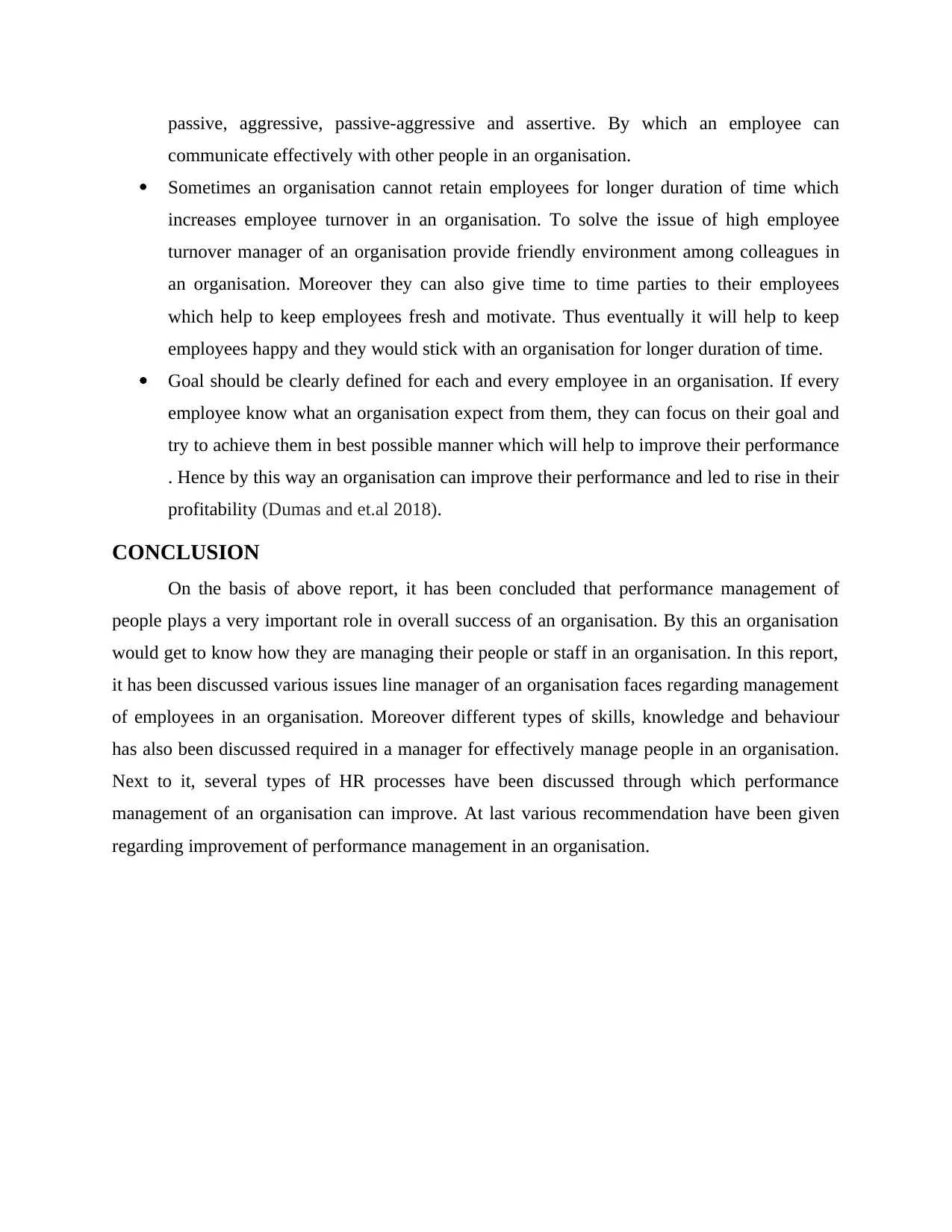
passive, aggressive, passive-aggressive and assertive. By which an employee can
communicate effectively with other people in an organisation.
Sometimes an organisation cannot retain employees for longer duration of time which
increases employee turnover in an organisation. To solve the issue of high employee
turnover manager of an organisation provide friendly environment among colleagues in
an organisation. Moreover they can also give time to time parties to their employees
which help to keep employees fresh and motivate. Thus eventually it will help to keep
employees happy and they would stick with an organisation for longer duration of time.
Goal should be clearly defined for each and every employee in an organisation. If every
employee know what an organisation expect from them, they can focus on their goal and
try to achieve them in best possible manner which will help to improve their performance
. Hence by this way an organisation can improve their performance and led to rise in their
profitability (Dumas and et.al 2018).
CONCLUSION
On the basis of above report, it has been concluded that performance management of
people plays a very important role in overall success of an organisation. By this an organisation
would get to know how they are managing their people or staff in an organisation. In this report,
it has been discussed various issues line manager of an organisation faces regarding management
of employees in an organisation. Moreover different types of skills, knowledge and behaviour
has also been discussed required in a manager for effectively manage people in an organisation.
Next to it, several types of HR processes have been discussed through which performance
management of an organisation can improve. At last various recommendation have been given
regarding improvement of performance management in an organisation.
communicate effectively with other people in an organisation.
Sometimes an organisation cannot retain employees for longer duration of time which
increases employee turnover in an organisation. To solve the issue of high employee
turnover manager of an organisation provide friendly environment among colleagues in
an organisation. Moreover they can also give time to time parties to their employees
which help to keep employees fresh and motivate. Thus eventually it will help to keep
employees happy and they would stick with an organisation for longer duration of time.
Goal should be clearly defined for each and every employee in an organisation. If every
employee know what an organisation expect from them, they can focus on their goal and
try to achieve them in best possible manner which will help to improve their performance
. Hence by this way an organisation can improve their performance and led to rise in their
profitability (Dumas and et.al 2018).
CONCLUSION
On the basis of above report, it has been concluded that performance management of
people plays a very important role in overall success of an organisation. By this an organisation
would get to know how they are managing their people or staff in an organisation. In this report,
it has been discussed various issues line manager of an organisation faces regarding management
of employees in an organisation. Moreover different types of skills, knowledge and behaviour
has also been discussed required in a manager for effectively manage people in an organisation.
Next to it, several types of HR processes have been discussed through which performance
management of an organisation can improve. At last various recommendation have been given
regarding improvement of performance management in an organisation.
⊘ This is a preview!⊘
Do you want full access?
Subscribe today to unlock all pages.

Trusted by 1+ million students worldwide
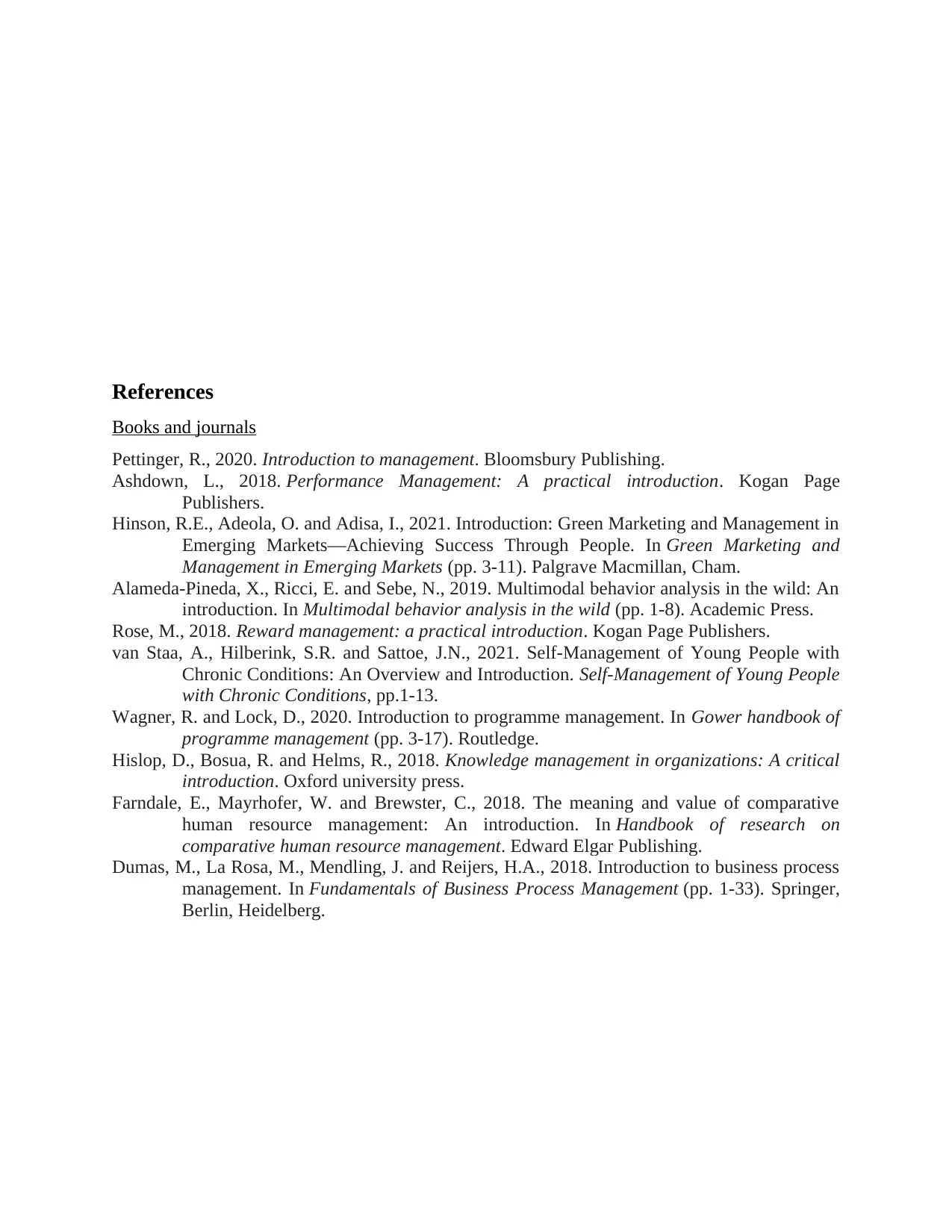
References
Books and journals
Pettinger, R., 2020. Introduction to management. Bloomsbury Publishing.
Ashdown, L., 2018. Performance Management: A practical introduction. Kogan Page
Publishers.
Hinson, R.E., Adeola, O. and Adisa, I., 2021. Introduction: Green Marketing and Management in
Emerging Markets—Achieving Success Through People. In Green Marketing and
Management in Emerging Markets (pp. 3-11). Palgrave Macmillan, Cham.
Alameda-Pineda, X., Ricci, E. and Sebe, N., 2019. Multimodal behavior analysis in the wild: An
introduction. In Multimodal behavior analysis in the wild (pp. 1-8). Academic Press.
Rose, M., 2018. Reward management: a practical introduction. Kogan Page Publishers.
van Staa, A., Hilberink, S.R. and Sattoe, J.N., 2021. Self-Management of Young People with
Chronic Conditions: An Overview and Introduction. Self-Management of Young People
with Chronic Conditions, pp.1-13.
Wagner, R. and Lock, D., 2020. Introduction to programme management. In Gower handbook of
programme management (pp. 3-17). Routledge.
Hislop, D., Bosua, R. and Helms, R., 2018. Knowledge management in organizations: A critical
introduction. Oxford university press.
Farndale, E., Mayrhofer, W. and Brewster, C., 2018. The meaning and value of comparative
human resource management: An introduction. In Handbook of research on
comparative human resource management. Edward Elgar Publishing.
Dumas, M., La Rosa, M., Mendling, J. and Reijers, H.A., 2018. Introduction to business process
management. In Fundamentals of Business Process Management (pp. 1-33). Springer,
Berlin, Heidelberg.
Books and journals
Pettinger, R., 2020. Introduction to management. Bloomsbury Publishing.
Ashdown, L., 2018. Performance Management: A practical introduction. Kogan Page
Publishers.
Hinson, R.E., Adeola, O. and Adisa, I., 2021. Introduction: Green Marketing and Management in
Emerging Markets—Achieving Success Through People. In Green Marketing and
Management in Emerging Markets (pp. 3-11). Palgrave Macmillan, Cham.
Alameda-Pineda, X., Ricci, E. and Sebe, N., 2019. Multimodal behavior analysis in the wild: An
introduction. In Multimodal behavior analysis in the wild (pp. 1-8). Academic Press.
Rose, M., 2018. Reward management: a practical introduction. Kogan Page Publishers.
van Staa, A., Hilberink, S.R. and Sattoe, J.N., 2021. Self-Management of Young People with
Chronic Conditions: An Overview and Introduction. Self-Management of Young People
with Chronic Conditions, pp.1-13.
Wagner, R. and Lock, D., 2020. Introduction to programme management. In Gower handbook of
programme management (pp. 3-17). Routledge.
Hislop, D., Bosua, R. and Helms, R., 2018. Knowledge management in organizations: A critical
introduction. Oxford university press.
Farndale, E., Mayrhofer, W. and Brewster, C., 2018. The meaning and value of comparative
human resource management: An introduction. In Handbook of research on
comparative human resource management. Edward Elgar Publishing.
Dumas, M., La Rosa, M., Mendling, J. and Reijers, H.A., 2018. Introduction to business process
management. In Fundamentals of Business Process Management (pp. 1-33). Springer,
Berlin, Heidelberg.
1 out of 10
Related Documents
Your All-in-One AI-Powered Toolkit for Academic Success.
+13062052269
info@desklib.com
Available 24*7 on WhatsApp / Email
![[object Object]](/_next/static/media/star-bottom.7253800d.svg)
Unlock your academic potential
Copyright © 2020–2026 A2Z Services. All Rights Reserved. Developed and managed by ZUCOL.





